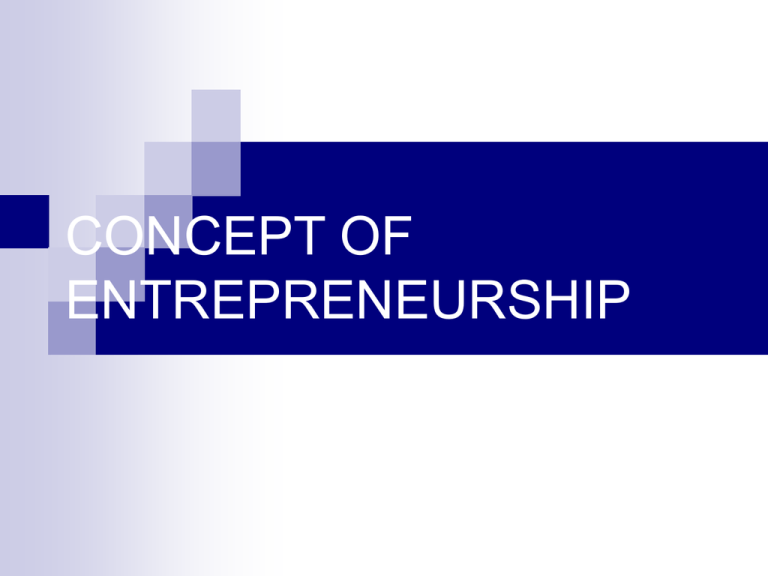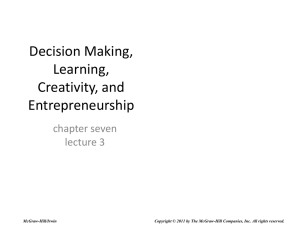CONCEPT OF ENTREPRENEURSHIP
advertisement

CONCEPT OF ENTREPRENEURSHIP Entrepreneurship is one of the four mainstream economics factors – land, labour, capital & entrepreneurship. Different economists have different opinion about entrepreneurship. Richard Cantillon, Frank H. Knight, J.B. Say developed the concept of entrepreneurship. Schumpeter considered entrepreneur is the source of dynamic change which leads to economic development. According to Kerzner, “Entrepreneurship means alertness towards profit opportunities. “Entrepreneur precedes entrepreneurship” According to A.H.Cole, “ Entrepreneurship is the purposeful activity of an individual or a group of associated individuals, undertaken to initiate, maintain or organise a profit-oriented business unit for the production or distribution of economic goods & series”. Therefore entrepreneurship can be defined as the prosperity of mind to take calculated risks with confidence to achieve a pre-determined business or individual objective. Mc-Clelland identifies two characteristics of entrepreneurship Doing things in a new and better way. Decision making under uncertainty. Entrepreneur Refers to a person. Creator. Organiser. Decision maker. Initiator. Leader. Motivator. Risk Taker. Entrepreneurship Refers to a process. Creation. Organisation. Decision making. Initiative. Leadership. Motivation. Risk Taking. Importance of Entrepreneurship Intangible factor. Moving Force. Leads to establishment & management of Small Business enterprises & setting up these units. Acts as a solution to the baffling problems like over population, unemployment, under employment and poverty. Leads to: Generation of employment. Increasing per capita income. Helping in capital formation. Balanced regional development. Promoting self reliance. HURDLES TO THE SUCCESS OF ENTREPRENEURSHIP IN INDIA Inadequate infrastructural facilities. Shortage of Capital. Shortage of Technical Knowledge. Shortage of Transport Facilities. Absence of Cheap & Good quality Raw-Material. Shortage of Power. FEATURES OF ENTREPRENEURSHIP Economic Activity. Decision making about resource allocation. Innovative Activity. Process of doing new thing i.e. introduction of new good, new method of production, new market, new source of supply of raw-material, new industry, etc. A function of High Achievement. Doing new things in a different and better way. Decision making under uncertainity. Creative & Purposeful Activity. The ability to bring something new into existence. Organising function. Brings together various factors of production, ensures the continuing management & reduces risk bearing function. Risk bearing function. Organising, Coordinating, Supervising & undertaking risk & handling economic uncertainty. INVENTIONS & INNOVATIONS. Inventions Creating Something New Resulting in New Knowledge. Innovations Transfering an idea into application. Resulting in new products, services or process. THEORIES OF ENTREPRENEURSHIP Economic Theory: 1. Versatile and multi – disciplinary. 2. Combining various factors of production. Sociological Theory: 1. Social movement. 2. Cultural values, family ties, trust effect, entrepreneurship. Psychological Theory: 1. It leads to setting & achieving goals by accepting moderate risks. Anthropological Theory: 1. Entrepreneurship behavior means to connect different spheres in the society. Problems in Growth of Entrepreneurship Incompetence and Poor Management. Involvement of High Risks. Socio- Cultural Rigidities. Lack of Motivation. Lack of Infrastructural Facilities. Lack of Communication Network. Market Imperfection. Legal Formalities. INTRAPRENEURSHIP Establishment of Entrepreneurship activity in large organisations to improve Products & Services. Intrapreneur are the employees of organisations who have something new, but does not have funds to start new business. Don’t Presume Ownership. No Financial Risk.







